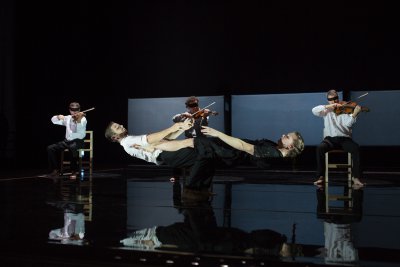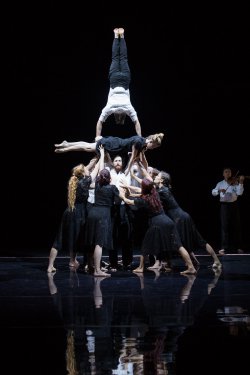Circa: Opus
An incredible display of physical dexterity that ultimately fails to gel into a work of art.

Paul O’Keeffe, Kathryn O’Keeffe and Debussy String Quartet in Circa’s “Opus” (Photo credit: Max Gordon)
[avatar user=”Joel Benjamin” size=”96″ align=”left” ] Joel Benjamin, Critic[/avatar] Is it churlish to criticize extraordinarily gifted athletes whose every move elicits gasps of awe and admiration? When does too much showing off become too much of a good thing? Those are the troubling quandaries that plagued me during and after seeing the Australian gymnastic/theatre/dance ensemble Opus on BAM’s prestigious NextWave series in a work called Circa. It would be far easier to praise the jaw-dropping prowess of the performers than find fault with the work’s overall construction, or lack thereof, but this wasn’t billed as a circusy parade of dexterity, but as a work with artistic merit.
Opus, created by Circa’s artistic director Yaron Lifschitz, aims at some deep meaning it never quite reveals. Performed to Shostakovich’s dark-hued chamber music played live by the exquisite Debussy String Quartet, Circa puts the lithe, beautiful members of Opus through their paces. The disparity between the constant onslaught of agile tricks and physical derring-do and the layered, passionate Shostakovich score became more and more obvious as this 90-minute work unfolded (and, not for no reason, Libby McDonnell’s costumes became skimpier and skimpier!). The members of the Debussy Quartet, dressed in white shirts and black pants, constantly wandered about the large stage of the Howard Gilman Opera House often guided, even lifted, by the performers—sometimes barefoot, sometimes blindfolded—playing, remarkably, from memory. Unfortunately, over-amplification did not benefit Shostakovich. The four musical selections provided an aural environment that was fundamentally ignored: the complex music was the backdrop to ever more devilishly complex gymnastics. Sudden chords resulted in spasmodic jumps and large wrenching movements; the sadder sections elicited slow motion versions of lifts, throws, balances, etc. The compilation of tricky acrobatics never matched the poignancy, subtlety, ambiance or overall richness of the Shostakovich music.
The sobriquet “tricks” is probably not a fair or adequate description of the acrobatic feats these fourteen gymnasts displayed. Their tours de force included: balancing upon each others’ shoulders like giant totem poles; forming arches in backbends upon which others balanced; hanging precariously from ropes and stretches of cloth; and forming impossibly balanced sculptures. They hung off each other. They rolled on the floor and on each other. They formed lines and circles that communicated a certain sense of communal camaraderie, but little else. Gender didn’t seem to matter: women did as much lifting as the men.
The appeal of acrobatic entertainment endures for a reason—just look at ancient Egyptian hieroglyphics—but, aside from representing a stunning pinnacle of physical perfection—which the members of Circa certainly do—Opus appealed more to the hormones than the heart or brain.
Shostakovich did a great deal to make Opus artful, but the production didn’t do much for Shostakovich.
Circa: Opus (November 4 – 6, 2015)
Next Wave Festival
BAM Howard Gilman Opera House, Brooklyn Academy of Music, 30 Lafayette Avenue in Brooklyn
For tickets, call 718-636-4100 or visit http://www.BAM.org/NextWave
For more information, visit http://www.circa.org.au
Running time: 90 minutes with no intermission







Leave a comment